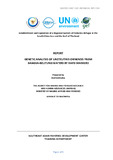Genetic Analysis of Uroteuthis Chinensis from Bangka Belitung Waters by RAPD Markers.
抄録
In this study, a genetic analysis using RAPD (Randomly amplified polymorphic DNA) was carried out. The use of RAPD markers for genetic studies in several cephalopods has been reported to be successful in identifying genetic differentiation at the population level (Ibanez et al., 2011; Sandoval-Castellanos et al, 2007; Sands et al., 2003). By considering the limited DNA sequence available for U. chinensis from karimata strait, a preliminary study using available reference sequence from genebank was hard to conduct. This preliminary study was usually important to screen the best marker and molecular technique for genotyping either by sequence data or DNA fingerprinting technique (RFLP, T-RFLP, etc). However, the use of RAPD marker was viewed as the most potential alternative marker, supported by its ability to identify polymorphic alleles and provide a genetic characteristic of the species being analyzed. This study was successfully demonstrated the U. chinensis amplification product from three RAPD markers, and the resulting 7-10 band.
記述
This report is under the SEAFDEC/UNEP/GEF Project on “Establishment and Operation of a Regional System of Fisheries Refugia in the South China Sea and Gulf of Thailand”
Citation
Indriatmoko, 2022. Establishment and Operation of a Regional System of Fisheries Refugia in the South China Sea and Gulf of Thailand, Report of Genetic Analysis of Uroteuthis Chinensis from Bangka Belitung Waters by RAPD Markers. Southeast Asian Fisheries Development Center, Training Department, Samut Prakan, Thailand; FR/REP/ID34, 10 p.

